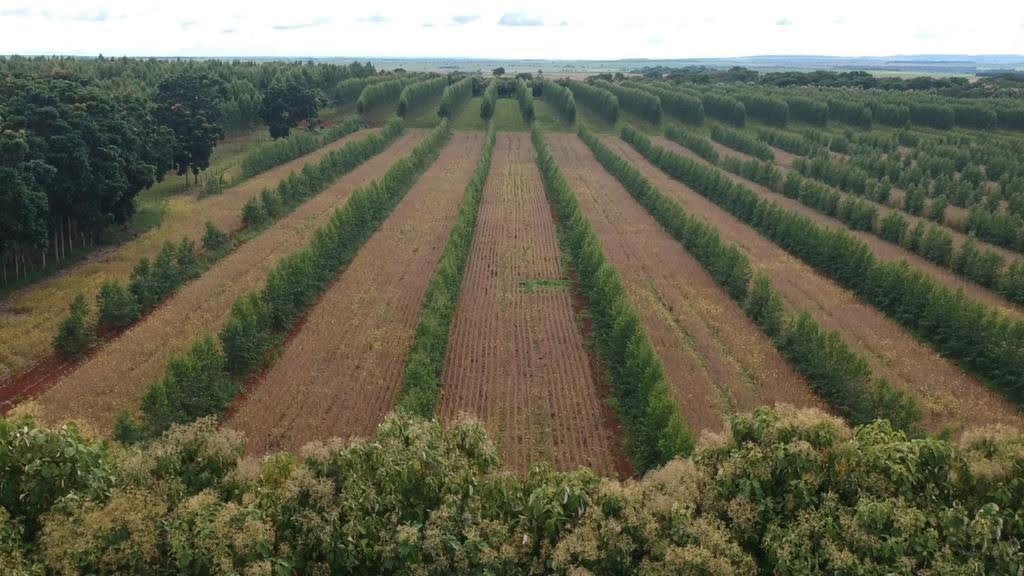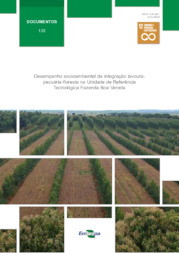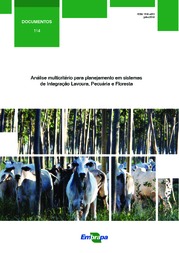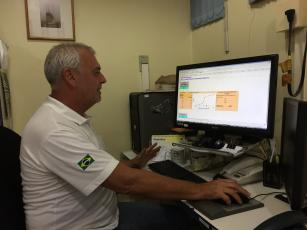Research helps ICLFS meet criteria for environmental impact assessment
Research helps ICLFS meet criteria for environmental impact assessment
Photo: Abilio Rodrigues Pacheco

Boa Vereda Farm has become a Technological Reference Unit (TRU), whose positive technological and socio-environmental results are an example for other enterprises
Embrapa researchers have analyzed an establishment that is a reference in Integrated Crop-Livestock-Forestry Systems (ICLFS) in regard to sustainability, in order to turn it into a unit that demonstrates sustainable intensification.
To analyze the socio-environmental performance of ICLFS, which has been adopted in the property for 12 years, they used Environmental Impact Assessment (EIA) criteria according to the Ambitec-Agro indicator system, at Boa Vereda Farm, in the city of Cachoeira Dourada, Goiás, Brazil.
According to the researchers, the target was to offer environmental management recommendations immediately based on the EIA and on an integrated vision of the rural establishment, and check the hypothesis that the adoption of ICLFS creates positive technological and socio-environmental impacts. "Such assessments fulfill important goals, such as the proposition of good management practices, improvement of production efficiency, pollution control, and minimization of negative impacts", they state in a recently launched publication.
The publication details a broad set of aspects and indicators, in a multicriteria approach, and was helped by an operating system used in obtaining evidence in the field, analysis, interpretation, and communication of sustainability rates, which also works as a tool for methodology transfer and as a guide for similar exercises. "With this, it contributes to the expansion of an information base for an agriculture that is sustainable, environmentally healthy, economically successful and socially favorable", they emphasize.
Researcher Claudio Buschinelli, from Embrapa Environment, is the study's first author. He explains that "the EIAs are a set of appropriate procedures for the promotion of the environmental management of rural establishments and for decision-making regarding the adoption of technological innovations that favor the socio-environmental performance of production activities, including those that are characteristic of ICLFS, in order to meet sustainability criteria".
He informs that 153 technology transfer activities were conducted at the Boa Vereda Farm over the past 12 years, focusing on training and retraining consultants, businessmen, students, extension agents, employees of research aid and rural credit agencies, researchers, farmers, professors, technicians, among other agricultural professionals. 'These activities were divided into six categories: courses, technical visits and field days, news, lectures, awards, and institutional videos.
After the adoption of ICLF practices, Boa Vereda Farm became a Technological Reference Unit (TRU), whose positive technological and socio-environmental results are an example for other enterprises. Due to this, the property was one of the nine winners of the ‘Climate Positive Leaders Program 2021’, a Corteva Agriscience initiative to award farmers who successfully adopt a wide range of innovative systems and approaches that uniquely support their productivity goals while protecting land and water – practices that are positive for the climate.
According to the researchers, the adoption of ICLFS at Boa Vereda arose from the need for production diversification of the farm, whose economic dependence laid exclusively on low-yield extensive cattle farming, which was an important source of income in the region in the past. In recent years, the farm has been pressured by sugarcane demand as a consequence of the sugar and ethanol plants in the region. Nowadays, there is corn, millet, eucalyptus, grass and beef cattle in the farm.
Thus, they inform that "the products’ quality has been generally maintained, as is current practice, but with reduced exposure to chemical residues and with wood processing as a post-harvest activity. In some cases, bark removal promotes a greater organic matter contribution in production areas". The researchers also point out that the beef produced at the ICLFS is in line with the Carne Carbon Neutral Beef,denomination, a concept brand to add value to this product that was launched by Embrapa.
Such research at the TRU contributes to meeting the United Nations Sustainable Development Goal (SDG) 12, focusing on target 12.2 – 'By 2030, achieve the sustainable management and efficient use of natural resources', by providing management recommendations for the rural establishment's environmental administration, as well as offering a structured procedure for sustainability registration, interpretation and communication.
Ambitec Agro
The Agricultural Technology Environmental Impact Assessment System (Ambitec-Agro) aims to help agriculture and cattle raising R&D institutions in the evaluation of research projects, as well as to aid farmers and decision makers choose better options for practices, types of management,and technologies aimed at the sustainable development of rural activities.
It consist of a set of multicriteria matrices that integrate performance indicators for technological innovations and management practices adopted in rural activities. Seven essential aspects of evaluation are considered: Supply and Resources Usage; Environmental Quality; Respect for the Consumer, Employment; Income; Health; and Management and Administration.
The criteria and indicators are built in weighting matrices in which data obtained in the field alongside the farmer/establishment administrator are automatically transformed into impact indicators that are expressed graphically.
The impact assessment results allow the farmer/administrator to determine which management practices promote their activity's performance. They also enable decision makers, managers and organizations to point out measures to promote or control the adoption of technology, according to sustainable local development plans. Ultimately, they provide for an objective impact measure unit, which helps to qualify, select and transfer agriculture and cattle raising technologies.
"In view of the flexibility in the face of various farming contexts found in Brazil's diverse rural environment, the application and resultant dissemination of such methods with reference rural establishments allow not only the necessary confirmation of their technical value, but also the promotion and communication on production systems that prove their sustainability", emphasizes researcher Geraldo Stachetti Rodrigues, one of the developers of Ambitec-Agro’s method.
The authors of Document 135 comprise researchers Claudio Cesar de Almeida Buschinelli (Embrapa Environment), Cristiane Aparecida Fioravante Reis, Alisson Moura Santos, Abílio Rodrigues Pacheco (Embrapa Forestry) and Geraldo Stachetti Rodrigues (Embrapa Environment). The publication is available for download here.
Eliana Lima (MTb 22.047/SP)
Embrapa Environment
Press inquiries
meio-ambiente.imprensa@embrapa.br
Phone number: +55 19 3311.2748
Translation: Alessandra Marin, supervised by Mariana Medeiros (13044/DF)
General Secretariat
Further information on the topic
Citizen Attention Service (SAC)
www.embrapa.br/contact-us/sac/



